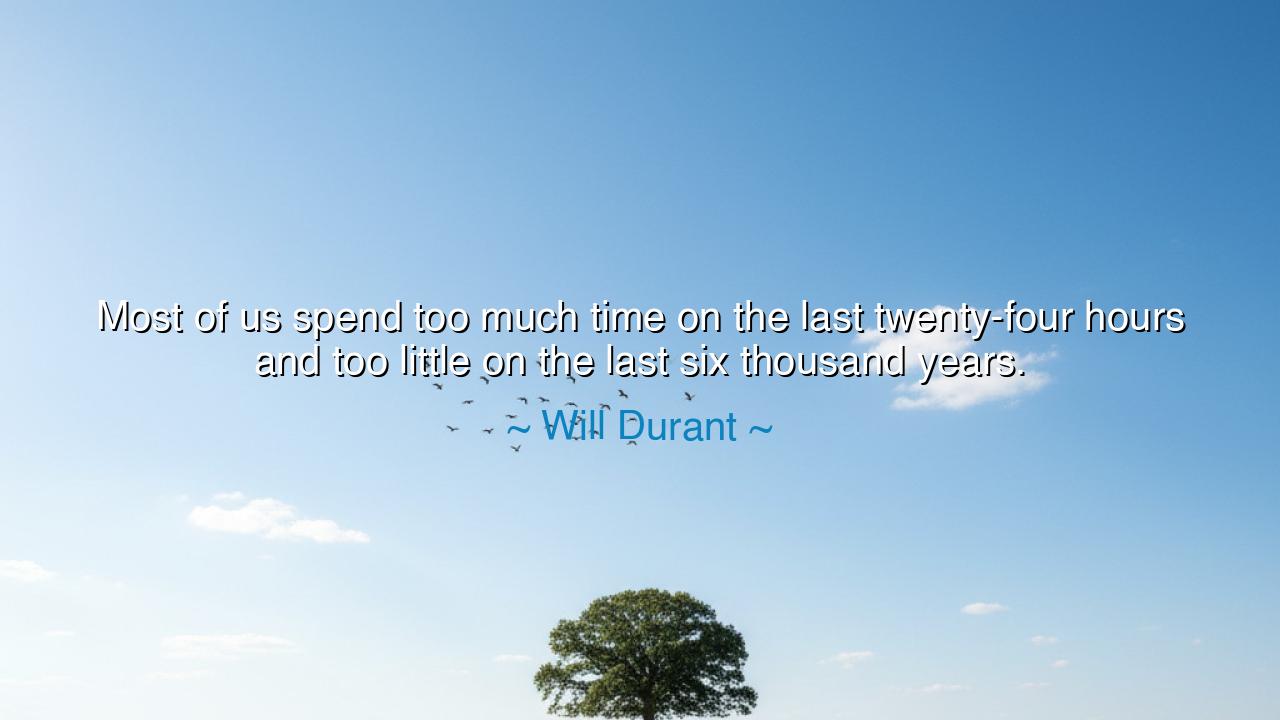
Most of us spend too much time on the last twenty-four hours and
Most of us spend too much time on the last twenty-four hours and too little on the last six thousand years.






“Most of us spend too much time on the last twenty-four hours and too little on the last six thousand years.” Thus spoke Will Durant, the great historian and philosopher, whose life’s work was to draw wisdom from the vast river of human experience. In these few words, he delivered a warning to the modern mind — a lament that humanity, lost in the noise of the present, has forgotten the silence and grandeur of its past. His voice, calm yet thunderous in meaning, reminds us that the lessons of history are not dead relics, but living truths, and that to ignore them is to walk blind into the future.
The origin of this quote flows from Durant’s monumental work, The Story of Civilization, a series that spanned more than four decades and traced the entire arc of human progress — from the dawn of Egypt and Greece to the age of Napoleon. Durant, who had spent his life in communion with the thinkers, poets, and builders of centuries past, saw how his own era — the age of machines, speed, and restless ambition — had become enslaved by immediacy. People fretted over news headlines, daily inconveniences, and fleeting pleasures, while neglecting the great treasury of wisdom preserved by their ancestors. In his eyes, the tragedy of modernity was not ignorance, but amnesia — the willful forgetting of the very knowledge that once guided humanity through storms far darker than our own.
When Durant speaks of “the last twenty-four hours,” he refers to our obsession with the immediate — the latest event, the newest technology, the most recent outrage. We live, he warns, imprisoned in the moment, chasing comfort and novelty while neglecting reflection. Yet the “last six thousand years” — the span of civilization itself — contains the collective memory of human triumph and folly, the blueprint of our successes and the record of our mistakes. Every moral struggle, every question of justice, every pursuit of beauty that we face today has already been lived and pondered by those before us. And still, we behave as though history began yesterday.
Consider the fall of Rome, that great mirror for all empires. The Romans, too, once believed themselves eternal. They built, they conquered, they reveled in power. Yet as generations passed, they turned inward — consumed by luxury, distraction, and self-interest. They forgot the stern virtues that had forged their strength. The warnings of their own historians — Livy, Tacitus, Sallust — were ignored. And so, the empire crumbled, not from the assault of barbarians, but from the erosion of memory. If the Romans, who had the wisdom of centuries before them, could forget, then so too can we — unless we heed the lessons of time. Durant, in his quiet wisdom, sought to keep such memory alive.
But Durant’s words are not only for nations; they are for every soul. Each person carries within them a small history — the heritage of parents, teachers, ancestors — yet how easily we discard it in our race toward the next sunrise. We make the same mistakes again and again because we have not taken the time to listen to those who came before us. The past is not a prison; it is a map. Those who consult it walk with clarity; those who ignore it stumble through darkness. The mind that lives only in the present may be efficient, but it will never be wise.
Durant teaches us that to live well, we must cultivate a historical imagination — a sense that our lives are threads in a tapestry woven across millennia. To read, to reflect, to remember — these are not idle pursuits, but acts of preservation. When you read the words of Confucius, you are hearing a voice that has survived the fall of dynasties. When you walk the streets of Athens or Rome, you walk upon the stones of minds that shaped your very freedom. To forget them is to break the chain of inheritance that links humanity to its higher self.
So, my children, hear this counsel: do not be captives of the hour. Look beyond the urgency of today and seek the long rhythm of time. When the world clamors for your attention, remember that the wisdom you need already lives in the echoes of centuries. Read the old books. Listen to the voices of those who wrestled with truth before you were born. Study not only your problems, but the patterns of history that gave them shape. For the mind that knows its past holds the key to its future.
Thus, in the spirit of Will Durant, remember this eternal law: the present is but a leaf upon the tree of time, and only by knowing the roots can one understand the growth. Live not as a creature of the day, but as a guardian of the ages. For history is not behind us — it lives within us — and to neglect it is to forget who we are, and what we are meant to become.






AAdministratorAdministrator
Welcome, honored guests. Please leave a comment, we will respond soon